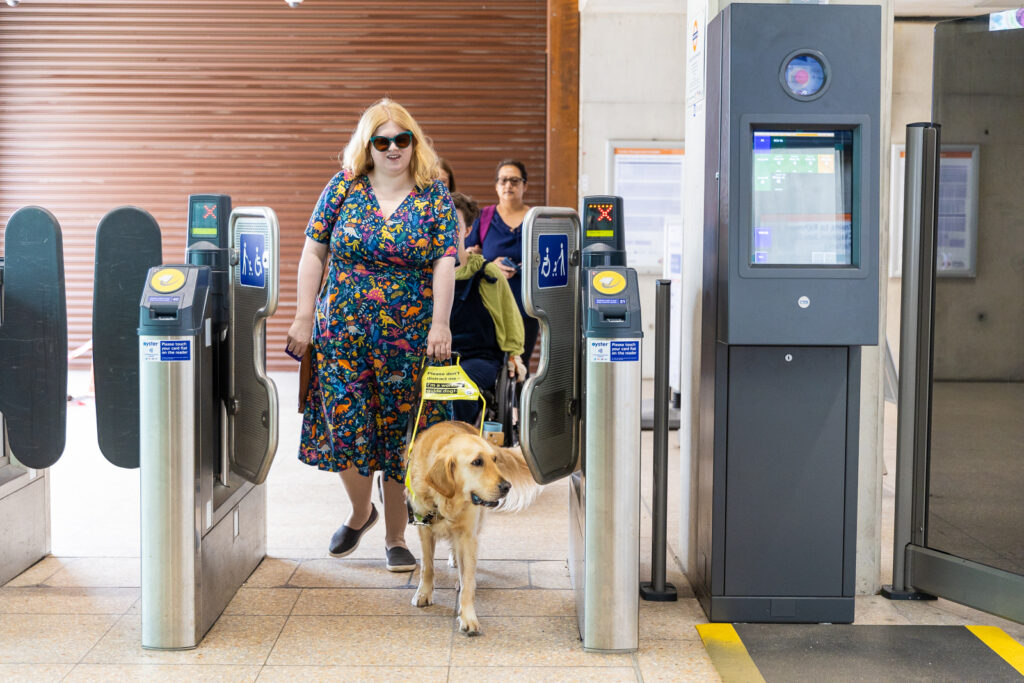As a blind guide dog handler who experiences travel anxiety, booking assistance is often an access need. In an unfamiliar station I can’t find staff easily. Guide Dog Ava will look for hi vis uniforms but sometimes she accidentally takes me up to a friendly group of builders. By using Passenger Assistance I can designate a meeting point and feel reassured that staff are expecting me.

This used to mean sitting on the phone for 30 to 40 minutes, repeatedly giving the same information and often without even a record of my booking. I’m now a busy working Mum and the speed of the app makes this process so much simpler. Securing additional space for my Guide Dog, requesting a ramp or assistance with my luggage, are easily selected on the app. The app is also accessible for my visual impairment with the pre-set colour contrast I need and enlarged font. If the assistance fails, I can immediately review it, leave comments and I have evidence to launch a complaint, which I have done several times.
I have been part of the Transreport Accessibility Panel for three years and I am delighted to have recently become the new Chair. As a disability activist I advocate for nothing about us without us. For too long disabled people have been handed “solutions” without participating in their design. At Transreport I have witnessed lived experience being listened to and valued, including when that feedback is critical and challenging.
My ambition is to expand these opportunities and for the wider transport industry to listen to our feedback, especially the critical and challenging views. The time, labour, experience and skills of disabled people need to be valued. Too often when there is an accessibility issue disabled people are offered a cup of tea and a chat instead of appropriate compensation or renumeration. Transreport is in the process of adding new panel members and soon we will be recruiting for research, focus groups and design projects. If you’re interested in being part of our wider research and feedback, you can express your interest by contacting Transreport using the form on the page at the following link: https://shorturl.at/Jz3L1
The rail industry needs to do more. Like many disabled people I’m still let down by inadequate infrastructure and failed assists on a weekly basis. For disabled people equality of access to rail travel requires significant infrastructure investment, staff training and culture change. The technology is part of that culture change and it provides an additional choice for disabled people who want to request assistance, but it is not the whole solution and it was never designed to be.
Turn Up and Go (TUAG) is a right. Using the app or any form of passenger assistance is a choice. Disabled people do not have to book. At familiar and well staffed stations, I don’t book. I will always need to rely on staff assistance. Even if every station became step free with level boarding it’s still inaccessible to me without sighted guiding. So protecting my right to TUAG is fundamental to my activism.
Train Operating Companies (TOCs) can use Transreport’s Passenger Assistance technology to record and communicate assistance. So when I TUAG there is a written record of the assistance I require and the details of my journey. Staff can easily check and share it, without having to rely on remembering or repeating a radio call. Recently this meant that when my journey was disrupted staff were able to take over the assistance smoothly as they instantly had the information about my ramp access needs. It also means I can hold staff and TOCs to account if I experience a failed assist.
I will keep holding the rail industry to account about the barriers disabled people face when accessing train travel. I’m an independent Chair and my role doesn’t prevent me from pursuing complaints, sharing my experiences online or campaigning for change. I’m also excited to explore how Transreport can bring disabled expertise into the wider travel industry and customer service environments. I’m particularly passionate about exploring opportunities to influence policy, regulators and Government so that they fully understand the benefits and limitations of technology solutions.
For many disabled people having information about support and booking assistance in advance is an access need. As Chair of Transreport’s Accessibility Panel I will strive to improve the systems to meet this access need. I will also keep highlighting how this is one access need amongst many. Ultimately the rail industry needs to recognise the journey towards a barrier free railway has been delayed for too long.